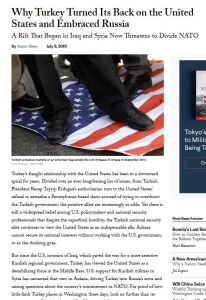Join getAbstract to access the summary!

Join getAbstract to access the summary!
Aaron Stein
Why Turkey Turned Its Back on the United States and Embraced Russia
A Rift That Began in Iraq and Syria Now Threatens to Divide NATO
Foreign Affairs, 2019
What's inside?
The US-Turkish alliance is at a crossroad.
Recommendation
By now, keen observers of international politics recognize that the alliance between Turkey and the United States is no longer what it once was. Turkey has, increasingly, been asserting its independence vis-à-vis the United States. Most notably, Turkey has defied its ally in instances where working with Russia better suited Turkey’s immediate interests. Middle East expert Aaron Stein provides background and explanations for the growing rift between the two NATO allies, laying down the facts rather than passing judgment on either of the two sides.
Summary
About the Author
Aaron Stein is Director of the Middle East Program at the Foreign Policy Research Institute.
















Comment on this summary